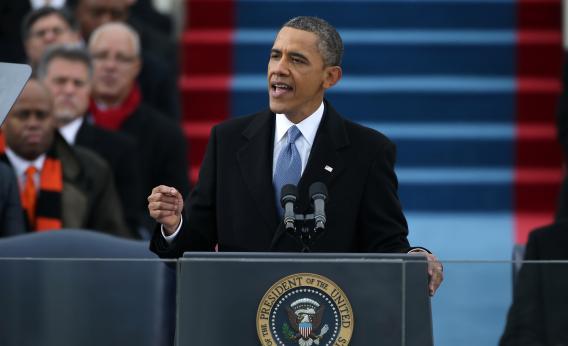Especially compared to his very in-the-moment crisis-focused first inaugural address, Barack Obama’s second inaugural today was surprisingly timeless and detached from the particular circumstances of the winter of 2012-13. Instead he offered a straightforward and fairly abstract case for economic liberalism in the American sense—a not even slightly anti-capitalism ideology that nonetheless believes in the importance of a robust welfare state and select government interventions in the economy to overcome collective action problems.
Summing up the ideological brief, Obama even indulged in American liberalism’s favorite ideological tic—the insistence that it’s not an ideology at all, but simply a pragmatic response to changing circumstances.
And it’s a good speech, too! A lot of it dealt with “social” issues or foreign affairs, but in terms of economics I would say this was the key graf:
We, the people, still believe that every citizen deserves a basic measure of security and dignity. We must make the hard choices to reduce the cost of health care and the size of our deficit. But we reject the belief that America must choose between caring for the generation that built this country and investing in the generation that will build its future. For we remember the lessons of our past, when twilight years were spent in poverty, and parents of a child with a disability had nowhere to turn. We do not believe that in this country, freedom is reserved for the lucky, or happiness for the few. We recognize that no matter how responsibly we live our lives, any one of us, at any time, may face a job loss, or a sudden illness, or a home swept away in a terrible storm. The commitments we make to each other – through Medicare, and Medicaid, and Social Security – these things do not sap our initiative; they strengthen us. They do not make us a nation of takers; they free us to take the risks that make this country great.
There are a lot of ideas here and they attempt to offer a thorough response to the pseudo-Randian ideology currently ascendant on the right. He starts by rejecting the idea that the federal government has a fixed budget constraint that renders it incapable of meeting obligations to seniors and forward-looking public service needs of students and parents. You can raise taxes!
And then there’s the twofold case for the welfare state. On the one hand, it’s the right thing to do. No person is full master of their own destiny and everyone deserves protection against the vicissitudes on life. On the other hand, as a practical matter a dynamic market economic requires risk-taking. Policies to minimize downside risk facilitate risk-taking and increase rather than reduce the level of dynamism in society and the economy.
